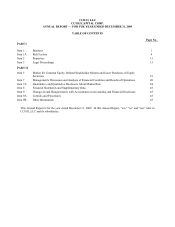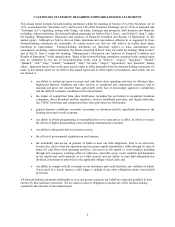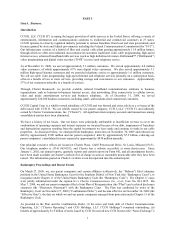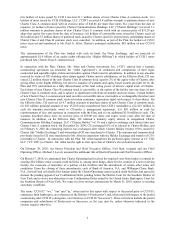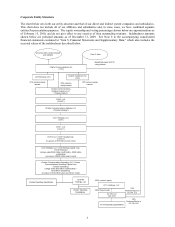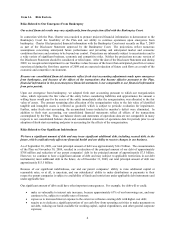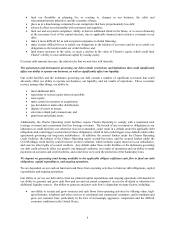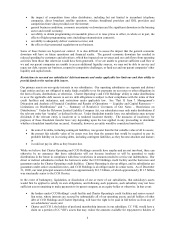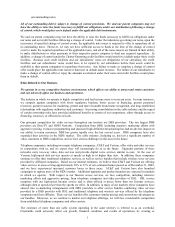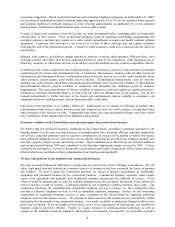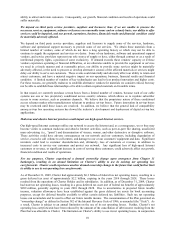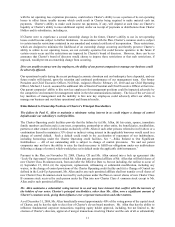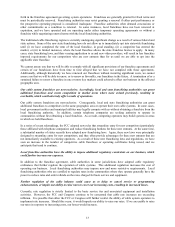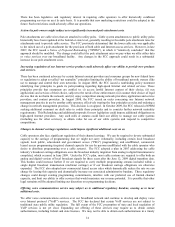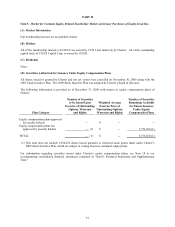Charter 2009 Annual Report Download - page 12
Download and view the complete annual report
Please find page 12 of the 2009 Charter annual report below. You can navigate through the pages in the report by either clicking on the pages listed below, or by using the keyword search tool below to find specific information within the annual report.
9
the effect that ongoing or future developments in these areas might have on our telephone and commercial
businesses and operations.
Our exposure to the credit risks of our customers, vendors and third parties could adversely affect our cash flow,
results of operations and financial condition.
We are exposed to risks associated with the potential financial instability of our customers, many of whom have
been adversely affected by the general economic downturn. Dramatic declines in the housing market over the past
year, including falling home prices and increasing foreclosures, together with significant increases in
unemployment, have severely affected consumer confidence and caused increased delinquencies or cancellations by
our customers or lead to unfavorable changes in the mix of products purchased. The general economic downturn
has also affected advertising sales, as companies seek to reduce expenditures and conserve cash. These events have
adversely affected, and may continue to adversely affect our cash flow, results of operations and financial condition.
In addition, we are susceptible to risks associated with the potential financial instability of the vendors and third
parties on which we rely to provide products and services or to which we outsource certain functions. The same
economic conditions that may affect our customers, as well as volatility and disruption in the capital and credit
markets, also could adversely affect vendors and third parties and lead to significant increases in prices, reduction in
output or the bankruptcy of our vendors or third parties upon which we rely. Any interruption in the services
provided by our vendors or by third parties could adversely affect our cash flow, results of operation and financial
condition.
We may not have the ability to reduce the high growth rates of, or pass on to our customers, our increasing
programming costs, which would adversely affect our cash flow and operating margins.
Programming has been, and is expected to continue to be, our largest operating expense item. In recent years, the
cable industry has experienced a rapid escalation in the cost of programming. We expect programming costs to
continue to increase, and at a higher rate than in 2009, because of a variety of factors including amounts paid for
retransmission consent, annual increases imposed by programmers and additional programming, including high
definition and OnDemand programming, being provided to customers. The inability to fully pass these
programming cost increases on to our customers has had an adverse impact on our cash flow and operating margins
associated with the video product. We have programming contracts that have expired and others that will expire at
or before the end of 2010. There can be no assurance that these agreements will be renewed on favorable or
comparable terms. To the extent that we are unable to reach agreement with certain programmers on terms that we
believe are reasonable we may be forced to remove such programming channels from our line-up, which could
result in a further loss of customers.
Increased demands by owners of some broadcast stations for carriage of other services or payments to those
broadcasters for retransmission consent are likely to further increase our programming costs. Federal law allows
commercial television broadcast stations to make an election between “must-carry” rights and an alternative
“retransmission-consent” regime. When a station opts for the latter, cable operators are not allowed to carry the
station’ s signal without the station’ s permission. In some cases, we carry stations under short-term arrangements
while we attempt to negotiate new long-term retransmission agreements. If negotiations with these programmers
prove unsuccessful, they could require us to cease carrying their signals, possibly for an indefinite period. Any loss
of stations could make our video service less attractive to customers, which could result in less subscription and
advertising revenue. In retransmission-consent negotiations, broadcasters often condition consent with respect to
one station on carriage of one or more other stations or programming services in which they or their affiliates have
an interest. Carriage of these other services, as well as increased fees for retransmission rights, may increase our
programming expenses and diminish the amount of capacity we have available to introduce new services, which
could have an adverse effect on our business and financial results.
Our inability to respond to technological developments and meet customer demand for new products and services
could limit our ability to compete effectively.
Our business is characterized by rapid technological change and the introduction of new products and services, some
of which are bandwidth-intensive. We may not be able to fund the capital expenditures necessary to keep pace with
technological developments, or anticipate the demand of our customers for products and services requiring new
technology or bandwidth. Our inability to maintain and expand our upgraded systems and provide advanced
services in a timely manner, or to anticipate the demands of the marketplace, could materially adversely affect our


